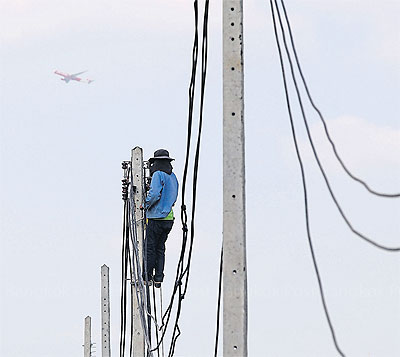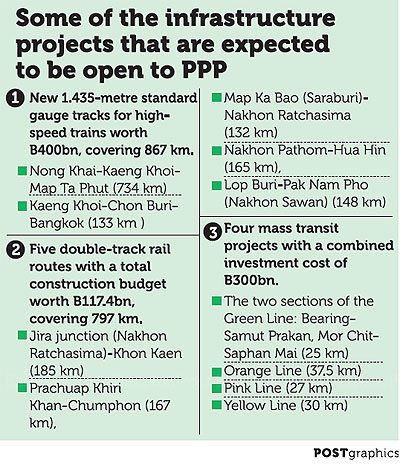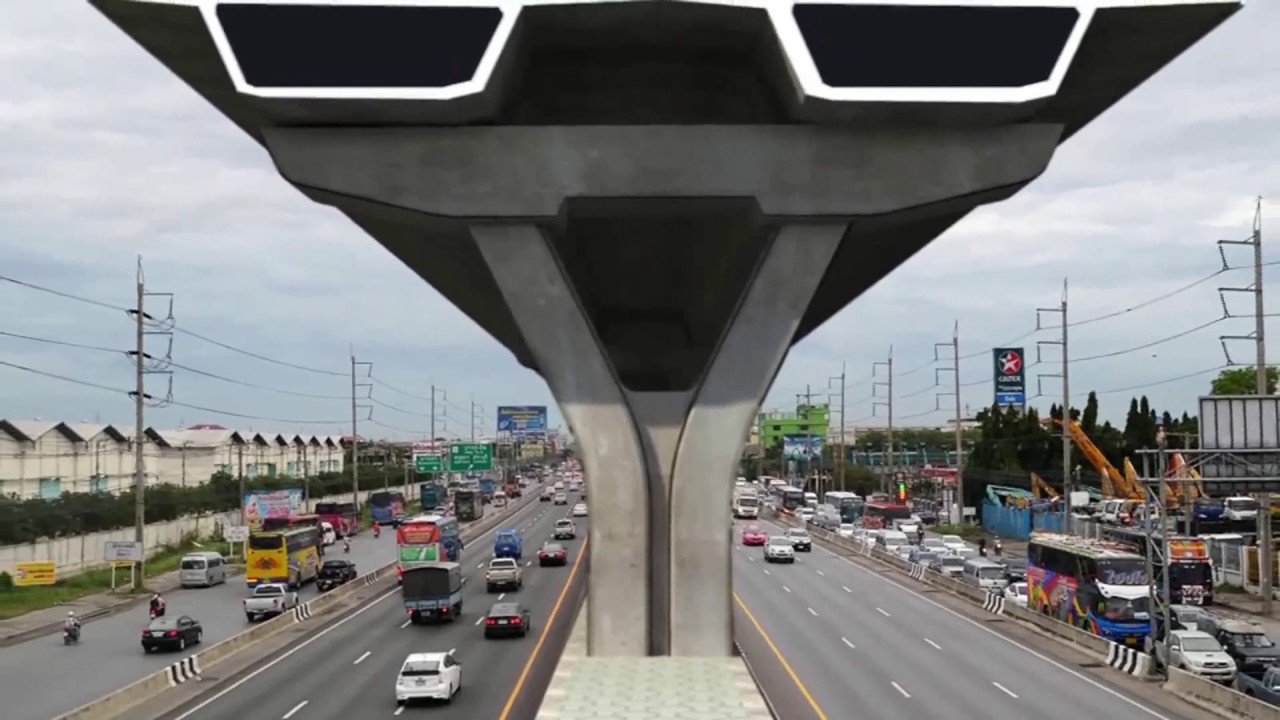The government’s strategic public-private partnership plans are about to be finalised, with all regulations expected to be settled early next month.
A worker installs a transmission line at a new rail route of the State Railway of Thailand in Bangkok’s Laksi district. Investment under public-private partnerships is expected to start soon. PATTARAPONG CHATPATTARASILL
The Public-Private Partnership Policy Committee chaired by Deputy Prime Minister MR Pridiyathorn Devakula yesterday approved another five organic laws to facilitate joint investments by the private sector.
The committee last year approved eight organic laws including those governing project value calculation.
Additional regulations approved yesterday are mainly about the method to calculate project value, procedures to invite private firms into joint investments, the screening process, contract standards and joint investments by private firms in projects worth less than 1 billion baht.
MR Pridiyathorn said the law improvements would help the government to speed up infrastructure projects.
The new regulations will allow responsible ministries to approve projects worth less than 1 billion baht. Only projects worth 1-5 billion baht are required to be vetted by the committee.
“The private sector will be allowed to play a greater role in all the 3.3-trillion-baht infrastructure projects planned in eight years only if they really want to invest,” MR Pridiyathorn said.
Public-private partnerships will be mainly used for the new train network, mass transit projects such as the Orange Line, Yellow Line and Pink Line, ports and broadband development. Social projects such as public health and education will be also open for joint investment.
The military-installed cabinet last October approved an eight-year infrastructure development programme for 2015-22 worth 3.3 trillion baht. The budget is well above the 2.4 trillion baht outlined by the National Council for Peace and Order in July or the 2-trillion-baht plan of the previous government.
The government’s proposals have a lot in common with the blueprint of the ousted Pheu Thai-led administration. However, they have been revised to take into account economic viability and funding alternatives to government borrowing. The development time frame has also been extended to eight years from seven.
The most dramatic change is perhaps the switch from high-speed rail to a double-track service, with 1.435-metre standard gauge tracks suitable for trains running at 160-180 km/h on three routes. They will link the border province of Nong Khai to the industrial coastal region of Map Ta Phut in Rayong, a move that was advocated by experts but ignored by the Yingluck Shinawatra government.
The government is also committed to continuing the development of the mass transit system in Greater Bangkok. Plans are afoot to accelerate the construction of four projects covering 89 km including the Purple Line (Bang Yai-Bang Sue); the Blue Line extension (Bang Sue-Tha Phra/Hua Lamphong-Bang Khae); and the Green Line (Bearing-Samut Prakan). All construction should be completed by 2020.
The government is also calling for bids to build an 18.4-km route linking Mor Chit, Saphan Mai and Ku Kot in Pathum Thani. Construction is likely to start in 2016 and to be completed by 2020.
Six more routes totalling 144 km are also awaiting cabinet approval. They include the Orange Line from the Thailand Cultural Centre to Min Buri, the Pink Line from Khae Rai to Min Buri, the Yellow Line from Lat Phrao to Phattanakan, the Airport Rail Link from Don Mueang to Phaya Thai, the Light Red Line from Bang Sue via Hua Lamphong to Hua Mak, and the Dark Red Line from Rangsit to Thammasat University’s Rangsit campus. Construction of the six routes is planned between 2015 and 2021.
A feasibility study is also under way for another 8-km project linking Bang Khae and Phutthamonthon Sai 4. The project is due to be completed in 2021.
MR Pridiyathorn said the Transport Ministry was expected to propose the Orange Line, Yellow Line and Pink Line routes for cabinet approval this month.
“The private sector normally opts to invest mainly in projects that offer a high rate of investment return,” he said. “For rail development, the government may invest in civil works, while the private sector will be allowed to invest in trains, equipment and operating systems.”
Kulit Sombatsiri, director-general of the State Enterprise Policy Office, said investment under public-private partnerships was expected to kick off soon.



